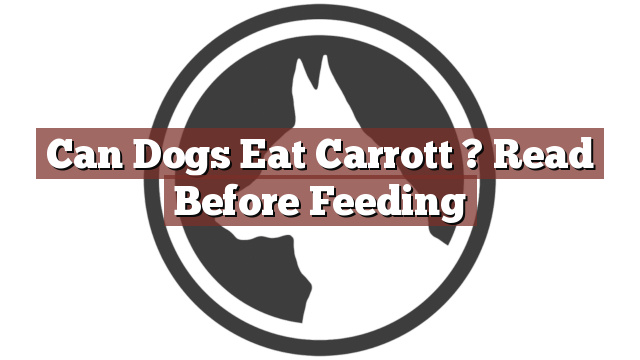Understanding Your Dog’s Dietary Needs
As a responsible pet owner, it is essential to understand your dog’s dietary needs to ensure their overall health and well-being. A balanced diet plays a crucial role in maintaining their energy levels, immune system, and overall vitality. While dogs are primarily carnivorous, they can also benefit from certain fruits and vegetables as part of their diet.
Can Dogs Eat Carrot? Read Before Feeding
Can dogs eat carrots? This is a common question among pet owners who want to provide a varied diet for their furry friends. The answer is yes, dogs can indeed eat carrots. In fact, carrots are a nutritious and low-calorie treat that can offer several health benefits to your canine companion.
Carrots are an excellent source of vitamins A, B6, and K, as well as beta-carotene, which can promote healthy vision, improve immune function, and support overall growth and development in dogs. Additionally, the crunchy texture of carrots can help maintain your dog’s dental health by reducing the buildup of plaque and tartar.
Pros and Cons of Feeding Carrots to Dogs
Feeding carrots to your dog can have several advantages, but it is important to consider any potential drawbacks as well. Let’s explore the pros and cons:
Pros:
- Nutritional Benefits: Carrots are packed with essential vitamins and minerals that can boost your dog’s overall health and well-being. They are low in calories and high in fiber, making them an excellent choice for dogs on a weight management plan.
- Oral Health: The chewing action required to consume carrots can help remove plaque and tartar from your dog’s teeth, promoting better oral hygiene.
- Digestive Health: The high fiber content in carrots can aid digestion and regulate bowel movements in dogs. This can be particularly beneficial for dogs with sensitive stomachs or constipation issues.
Cons:
- Portion Control: While carrots are generally safe for dogs, it is important to feed them in moderation. Too many carrots can lead to an upset stomach or diarrhea due to their high fiber content.
- Choking Hazard: Depending on the size and breed of your dog, whole carrots may pose a choking risk. It is advisable to chop or grate carrots into smaller pieces before feeding them to your furry friend.
- Individual Sensitivities: Just like humans, dogs can have individual sensitivities or allergies to certain foods. If you notice any adverse reactions, such as vomiting or diarrhea, after feeding your dog carrots, consult your veterinarian.
Conclusion: Consider Carrots as a Healthy Supplement for Your Dog’s Diet
In conclusion, dogs can eat carrots and enjoy their many health benefits. However, like any food, carrots should be given in moderation and as part of a balanced diet. If you’re unsure whether carrots are suitable for your dog or have any concerns about their diet, it is always best to consult with your veterinarian. By providing your furry friend with a nutritious and varied diet, you can contribute to their overall health and happiness. So, next time you’re snacking on some carrots, consider sharing a few with your four-legged companion!
Thank you for taking the time to read through our exploration of [page_title]. As every dog lover knows, our furry friends have unique dietary needs and responses, often varying from one canine to another. This is why it's paramount to approach any changes in their diet with caution and knowledge.
Before introducing any new treats or making alterations to your dog's diet based on our insights, it's crucial to consult with a veterinarian about [page_title]. Their expertise ensures that the choices you make are well-suited to your particular pet's health and well-being.
Even seemingly harmless foods can sometimes lead to allergic reactions or digestive issues, which is why monitoring your dog after introducing any new food item is essential.
The content provided here on [page_title] is crafted with care, thorough research, and a genuine love for dogs. Nevertheless, it serves as a general guideline and should not be considered a substitute for professional veterinary advice.
Always prioritize the expert insights of your veterinarian, and remember that the health and happiness of your furry companion come first.
May your journey with your pet continue to be filled with joy, love, and safe culinary adventures. Happy reading, and even happier snacking for your canine friend!

